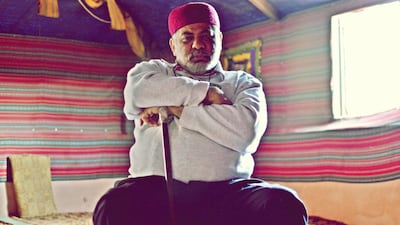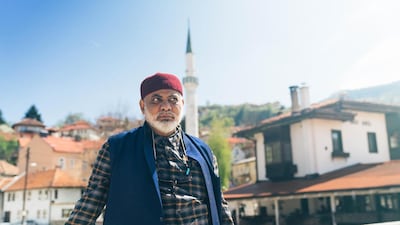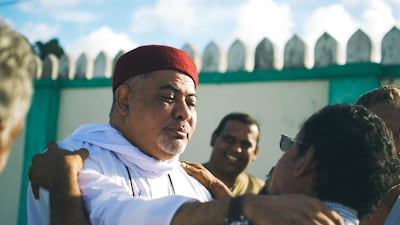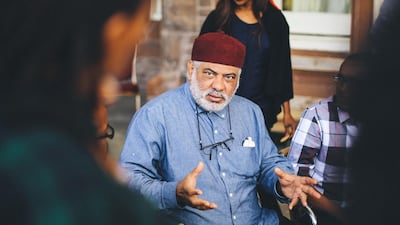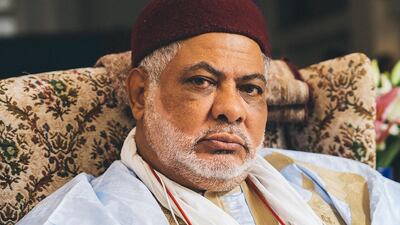When the coronavirus struck down Fuad Nahdi six weeks ago, the loss of the prominent elder was a grievous blow to the British Muslim community and the many proteges he inspired.
Not only would his charismatic presence be missed, but his death from Covid-19 threatened to put an end to a lifetime of work that shaped the dialogue within and around modern Islam in Britain.
Now, however, his pioneering “vision of community, creativity and culture will live beyond the man” if a legacy fund set up in his name achieves its aims.
The online crowdfunding page for Dr Nahdi, a journalist, activist and interfaith leader, affectionately describes his life spent mentoring young people to become leaders, innovators, creators and visionaries.
He founded the MuslimWise magazine and then Q-News in the 1990s, and set up the Radical Middle Way organisation after the July 7 bombings in 2005 to bring a back-to-basics theology to Islam and counter-extremist ideology.
Since his death, his son, Nadir, 30, says that the family had been working endlessly to come up with an appropriate commemoration to extend this influence to future generations.
“A pang of guilt fills my heart that not enough was done to celebrate him in life, and I won’t let that happen in his passing,” he wrote in a Facebook post.
Dr Nahdi, who had cancer and diabetes, tested positive for Covid-19 after he died aged 62 in a London hospital on March 21.
Nadir told The National that there were times when he would become frustrated with his father for putting everyone else before his own health, but that the outpouring of adoration and memories shared in recent weeks had been a comfort.
“The results of a lifetime of self-sacrifice for the community came back to us all at once,” he said. “An explosion of love. It was so moving.
“We lost him in unprecedented times. We always imagined his funeral to be full of people, a festival to celebrate his life. It would have been filled to the rafters. Yet Covid-19 and isolation stripped us of that luxury, and we had to think of alternative means to celebrate him.
“This was where technology helped connect us to a bigger crowd than we ever imagined. We livestreamed the whole funeral, and over 10,000 people from around the world were able to join us in prayers, celebration and remembrance of him all at once.”
He described as overwhelming the reception to the fundraising campaign, set up on May 2 with Dr Nahdi’s long-time friend Abdul-Rehman Malik, the British Muslim commentator and educator.
In days, two-thirds of the £25,000 target has been reached. Nadir said that the money would be used to set up a Convergence Trust to invest in grassroots education programmes, to guide the next generation of influencers and thinkers, and to create an archive of his father’s many works and projects.
Born in Tanzania with a mixed Yemeni-Indonesian ancestry, Dr Nahdi grew up in Kenya before moving to study journalism at City University, London, in 1983.
He believed that religions should take an approach of convergence not conversion, and was awarded the Interfaith Gold Medallion in 2012 for his work in bringing together people of all faiths or none. Two years later, he became the first Muslim to address the Church of England’s General Synod. Rowan Williams, the former head of the Church, was a close friend.
At the time, Dr Nahdi said: “I will enter the synod the way I would have entered the house of Jesus of Nazareth - in awe and wonderment seeking brotherhood and understanding. My lips, however, will be repeating the prayer of Moses: ‘My Lord, I ask you to expand my breast, make my task easy, undo the knot in my tongue so that my speech will become comprehensible.’”
His wife of 31 years, the activist Humera Khan, used a long and moving tribute on Medium, to particularly highlight his conscientiousness in defending the rights of women. Ms Khan said that Dr Nahdi had a unique ability to see beyond the dominant understanding that prevailed in Muslim cultures throughout his lifetime.
One of her greatest desires, she said, was for Dr Nahdi’s example to be emulated, even just a little, by “our menfolk”. “Since Fuad’s passing, I have spoken to so many of the men who loved Fuad sincerely, who cried unashamedly and I know miss him dearly," she said. "Dear brothers, my wish for you is to channel this love into your own personal transformation and to be the torchbearers for a different kind of society.”
Pondering what she wished Dr Nahdi's real legacy to be, Ms Khan said that undoubtedly the public aspects of his life would be recorded.
"But for me what is most important is not the speech making or the events organising.
“What is actually most important for me is Fuad’s private legacy, the things he did instinctively and deliberately to challenge the status quo and to bring about change, the listening he did to people’s troubles, the shoulders he gave to people to lean on, the intimidation of his presence when the need arose, and most importantly his infectious humour (often at my expense!) and his forgiving nature.”
If people honoured and consolidated Dr Nahdi’s attributes and achievements, the legacy fund would become an established charity to ensure that his many gifts to the community kept on giving.
The Fuad Nahdi Legacy Fund can be found on Launchgood.
